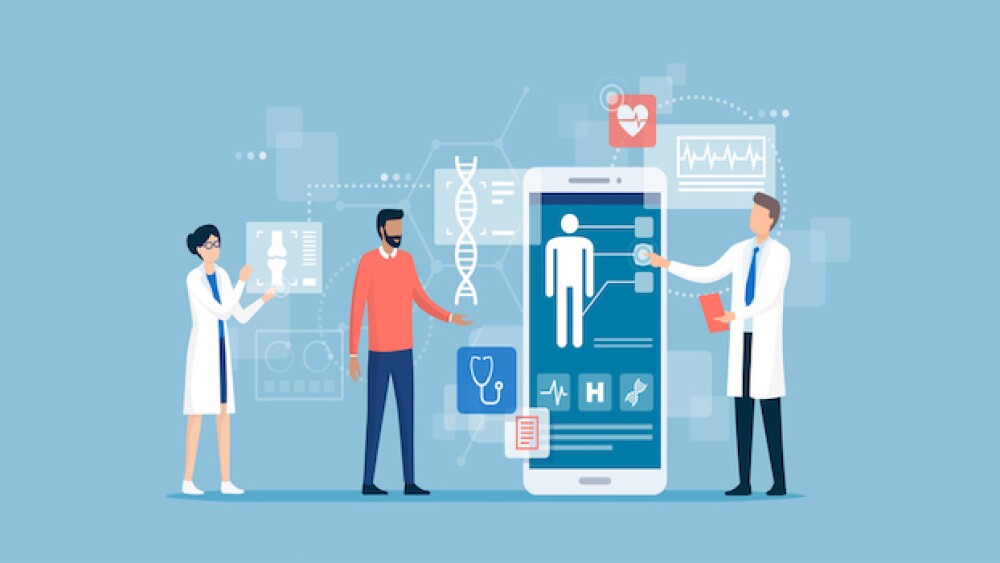New platforms are emerging to help biopharma companies fill their human studies more efficiently, but barriers remain to their successful implementation.
Pictured: A doctor points to a smartphone app while a patient looks on/iStock, elenabs
Emerging technologies like artificial intelligence have created additional opportunities to deliver life-saving medicine to patients faster than ever. Morgan Stanley has estimated that AI in early-stage drug development could translate into more than $50 billion in sales during the next decade. As a consultant for an internationally recognized firm who has worked with Fortune 500 healthcare and pharmaceutical companies, I have seen firsthand how new technology can accelerate results and drive revenue—if it’s implemented correctly. The pharmaceutical industry has a huge opportunity to realize those benefits through AI.
One area where this seems practical in the near term is in accelerating and improving the clinical trials recruitment process. Identifying and engaging a diverse range of participants has historically been a major challenge for pharmaceutical companies. Lack of community or grassroots outreach, limited visibility into patient data until later stages in the process and concerns around privacy have all contributed to stalled trials that prevent researchers from securing the most appropriate candidates. AI is poised to address these issues, and the work of several companies is starting to have a real impact.
Harnessing AI’s Potential
The work myTomorrows has done to help connect patients with medical studies is an example of how AI can fuel progress and improve processes for all stakeholders. The company’s TrialSearch AI platform combs through public trial registries to provide a comprehensive list of possible trial participants based on anonymized patient profile information. Testing on the tool showed that it can correctly identify the screenability of 72% of the required criteria and reduce prescreening checking time by 90%. Doctors can get back to caring for patients sooner, patients can get the help they need faster and pharmaceutical companies can quickly fill their trials with the most appropriate candidates.
Another example of AI technology that can improve clinical trial enrollment comes from Syneos Health and Haystack Health. Earlier this year, these companies launched a platform that assesses patient eligibility for trials based on unstructured medical records and generates a list of potential trial participants accordingly. This has allowed them to identify eligible patients who are less likely to fail trial screeners, a costly occurrence across the clinical research chain.
Importantly, as with TrialSearch AI, Syneos and Haystack’s patform doesn’t compromise patients’ personal information. Keeping patient information secure and anonymous is a large part of what has made these platforms feasible. With concerns around cybersecurity and privacy high on the minds of patients and regulators, pharmaceutical companies need to be attentive to how the tools they’re using are handling patient details. Be thorough in your due diligence and encourage front-line employees, who are often the first to see concerns, to speak up—then take those concerns seriously and act on them. Only with dual attention to data privacy and decreasing the hassle of trial enrollment can these platforms improve the lives of both patients and researchers.
Implementation
To take advantage of this potential boom, pharmaceutical leaders will need to not only understand how to leverage the new technology but also effectively mobilize their employees and address barriers to adoption. Once AI tools have been identified, integrating them into existing process flows will mean working across teams to develop new processes and behaviors. Everyone from junior staff to senior researchers will need to buy into these changes to achieve full integration and make the most of what AI can offer.
The benefits of harnessing AI’s potential are clear: faster enrollment, accelerated results and getting more healthcare solutions to more patients. Researchers and trial staff will be able to focus on higher-value tasks, improve the central management of enrollment across studies, decrease the time-intensive process of vetting individuals and create more opportunities for patients or their doctors to find an appropriate trial. Communicating these upsides can help get everyone on board with new technology while mitigating some of the fear around it.
Gaurav Gupta is a managing director at Kotter with global business experience translating strategy into successful implementation for clients in diverse industries. He is the co-author of the book Change, which details how leaders can leverage challenges and opportunities to make sustainable workplace changes in a rapidly accelerating world. He can be reached at gaurav.gupta@kotterinc.com.





